
When visitors enter the Denver Zoo, they’re typically greeted by the African penguin habitat, which opened just last fall.
But in recent weeks, that exhibit has been empty. In fact, all exhibits featuring the zoo’s birds, like the bald eagle and the great hornbill, are vacant. Signs outside all of the habitats explain why: A new strain of bird flu, or avian flu, has spread quickly since Colorado identified its first case in February, and the zoo is trying to keep its animals safe.
“They are coming out a couple times a day, so they can get access to the pool,” said the zoo’s senior vice president for life sciences Brian Aucone. “The staff stays here and monitors that the whole time to make sure we don't have waterfowl flying in, make sure that the exhibit’s clean and we don't have any goose poop.”
Much like the influenza virus that infects humans, the disease is highly contagious, resulting in a wide variety of symptoms, including sudden fatigue, decreased egg production, and nasal discharge. And because there’s no way to treat domestic poultry for the bird flu, infection usually means death.

Experts say the virus is primarily being spread by wild waterfowl, like geese and ducks, that are currently migrating through the United States. Even if they don’t land near other birds, their droppings could spread the virus just about anywhere.
The good news is that there is no evidence showing this strain of the avian flu can spread to humans.
USDA testing shows the flu’s presence in Colorado is relatively low so far. The most significant outbreak in the state has been at a farm in Montrose, where 60,000 chickens had to be euthanized to prevent the disease’s spread. There has yet to be a case at the Denver Zoo, but birds are being isolated indoors with little to no outdoor exposure.
“Anybody who's walking around in the world has a potential to accidentally walk through goose poop or duck poop and bring [avian flu] in with them,” Aucone said. “What we're doing for our staff is that they're required to put on what's called personal protective equipment. So covering their shoes, covering their clothing and stuff. They have shoes that are specific to the zoo at the moment, so they don't take it home.”
Commercial farmers are taking precautions to protect their flocks
Of course, not every flock owner has the same resources as a zoo. Tyler Kuntz, a chicken farmer in Hotchkiss, said his operation has increased security precautions to protect egg shipments produced by its 20,000 chickens.
“Stretching out the deliveries of feed and the egg pickup. And then the washing of personal vehicle tires and semi tires, we didn't normally do that, but that is something that we've decided that it's worth the extra time to do,” Kuntz said.
In addition to limiting human contact, Kuntz’s chickens can no longer go outdoors and have to stay under a roof, to prevent contact with wild birds.

Kuntz said if an infection hit his flock, which produces about 17,000 eggs a day, it would be devastating.
“[If] you lose your flock, you're looking at $200,000 to replace it,” Kuntz said.
If commercial flocks are affected, it isn’t just farmers that are impacted. Massive flock casualties have the potential to slow supply chains, according to Ragan Adams, a veterinary specialist at Colorado State University’s extension office.
“[Chickens] are a big part of the food supply, both in the production of eggs and in the meat,” Adams said. “At the rate that this outbreak is occurring, the food supply is probably not threatened, but certainly the cost of eggs and meat in chicken is going up because they're slightly less available.”
Backyard chicken are most vulnerable
Backyard chicken owners are especially at risk because most of their flocks are raised with free access to the outdoors. Megan May, who was convinced by her daughter to raise chicken during the pandemic, said her free-range flock hates being locked in their run.
“They complain very loudly. They want out, they wanna go scratch and run around,” May said. “At this point we still let them free-range every day. We just consider it part of that calculated risk.”
May is prepared to lock her flock indoors, but she’s worried about chickens getting bored and aggressive towards each other, something they’ve avoided by keeping them free range.
According to Adams, owners with small coops who let their birds freely roam outdoors need to get ready for sustained periods of keeping flocks indoors.
“Now would be a time to expand [coops] so you could keep your birds underneath a roof and away from wild birds,” Adams said.

Even if owners don’t suspect the bird flu has hit their birds, Adams urges people to call the state veterinary office at (303) 869 9130 and call CSU’s Veterinary Diagnostic Laboratory at (970) 297 4008 for free avian flu testing and a necropsy.
“It's important to know that you really should take action because we need to know where the virus is,” Adams said. "So, much like when we were going through COVID we wanted to make sure the people around those that had it were aware and providing more biosecurity to defend their animals or birds.”
Some experts also advise people to remove bird feeders from their backyards or to have a designated pair of shoes just for yard work.
They say it’s difficult to predict when the avian flu epidemic will end. Testing right now mainly consists of vets analyzing bird carcasses. That, coupled with ongoing bird migration, means no one knows the full extent of the diseases' spread across the nation.










